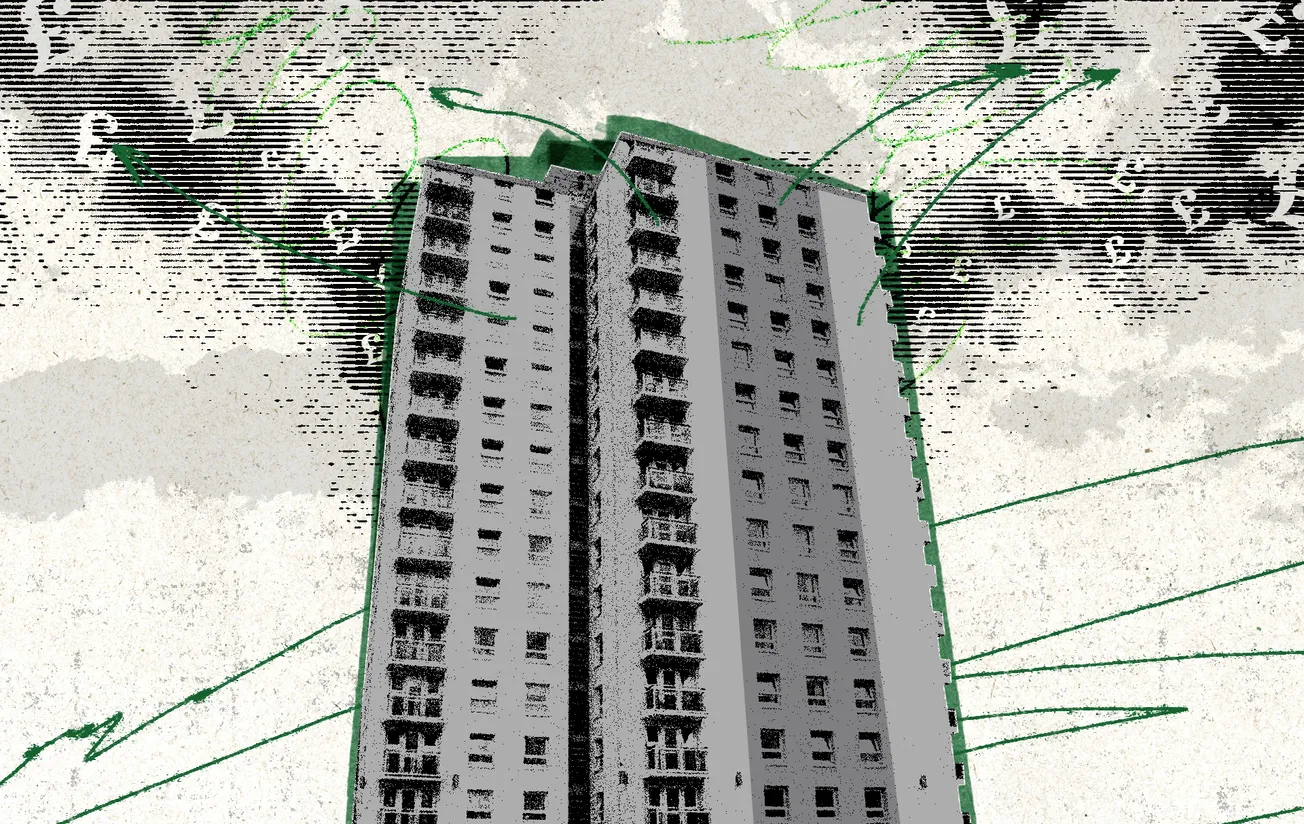By Kate Knowles
“My brother and residents at Devon Place had Christmas Day without heating or hot water and still await repairs.”
So began an email to a staff member at Lotus Sanctuary on Boxing Day 2021. For the tenants at this supported accommodation in Cheltenham, the holiday had been bleak. The distressed sibling went into more detail about the conditions: “They have been cold and without a hot shower, frustrating at any time but for people with struggles, low self-esteem, low mood and getting through a Covid Christmas, it’s a real knock to wellbeing and doesn’t make people feel cared about.”
Most Dispatch readers will know about Lotus Sancutary, a Wolverhampton-based non-profit which provided exempt accommodation to vulnerable people between 2018 and 2023, and its young founder Gurpaal Judge. Our months-long investigation into Lotus lifted the lid on a very unusual property empire, one that started after Judge says he had a moment of revelation while attending a Buddhist retreat.
Judge’s grand plan was to house as many homeless and otherwise vulnerable people as possible in “exempt accommodation”, a type of housing that provides added support and is therefore exempt from the normal housing benefits cap. Judge would sign long leases on all manner of properties and then try to persuade local councils to pay him to house people who were eligible for this kind of accommodation. Often, we’ve been told, the councils would refuse, saying that the housing was inappropriate or of poor quality.
In March this year Lotus collapsed, but not before its founder had profited handsomely. The newspaper CityAM, which has broken several important stories related to Lotus, reported earlier this year that a confidential bankruptcy document showed that in the year just before Lotus Sanctuary went bust, its directors (including Judge) had been paid £1.2 million.

When we published that story, we were aware that it was incomplete. We had told the business side of the story in detail, but we were lacking the human dimension. What was it like to live in the housing provided by Lotus Sanctuary or the other similar non-profit companies founded by Judge?
The first challenge of answering that question came from the most glaring hole in Judge’s business model: he generally failed to get tenants into the buildings on which he was signing long term leases. As we reported in our investigation earlier this month:
Publicly, he was citing very large numbers — the thousands of properties on which his companies had leases. But astonishingly, it turns out that most of these properties were not in fact housing vulnerable people. “Of the 2,500 beds they had, less than 300 were supported accommodation,” one former staffer recalls. The rest were either empty or had private rental tenants who were still in there from when the property had been taken over.
The other challenge was that supported accommodation residents tend to be highly vulnerable, transient people with little safety net, and can therefore be hard to reach. In an effort to speak to ex-Lotus tenants, I spent five hours last Wednesday wandering Wolverhampton with a list of addresses provided to me by Judge’s former employees.
I knocked on door after door in the hope that someone living at the properties would have been there before Lotus went into liquidation on 6 March. Those who answered had moved in only recently. Naturally, they did not know who had been living there before.
Fortunately, our story prompted various sources to come out of the woodwork. As soon as the piece was published, it began to circulate among former staff members and in wider property industry circles. As a result, we have now spoken to several more Lotus employees, including two people who worked for the company in senior positions.
We have also been given information by a lettings agent who sold one of Lotus’s most notorious properties, and correspondence from worried family members, the police, and comments left on social media by tenants themselves. Together they help to build a picture of what it was like to live in a Lotus Sanctuary property; or, in a broader sense, what it was like to be on the receiving end of Gurpaal Judge’s entrepreneurial wizadry.
‘You wouldn’t put a dog in there’
The homes I knocked on while trudging around Wolverhampton were a mix of flats in large and small blocks, and terraced houses. Generally, the properties looked a bit run down. According to one ex-staff member, Lotus had started out with “generally ok” quality properties, but once it began to grow at lightning speed in 2020, it seemed to be willing to take on anything.
“All those little houses around Wolverhampton, they had loads of those and then took on loads of similar ones around Stoke and Leicester and Derby,” the person says. “And they were all just absolute shitholes. You wouldn't put a dog in there.”
A recurring issue was confusion around who was responsible for utilities and council tax. Tenants were told these were included; all Lotus needed was the service charge and the housing benefit which was paid directly by the government.

But according to the ex-staffer, down the line that would suddenly change and tenants were expected to adjust to having to provide council tax without any support given to help them, or basic information like who the supplier was or even whether it was a top-up meter. People were left to get into “copious amounts of debt” the person told me. “They’d be sat in the dark, freezing and Lotus did nothing to sort anything out.”
Energy in the buildings was a recurring problem. A former staff member at Lotus remembers a time when one of the buildings didn’t have electricity or gas and a Lotus worker paid to get the utilities back up and running. “I remember them coming to me and saying they had to pay out of their own pocket and they were trying to get it [the money] back,” she recalls. She doesn’t know how the issue was resolved after she recommended they contact the finance team, but says the staff member was “struggling to get it back for weeks.”
A screenshot of a Facebook review made by one Jessica Clodius, a tenant of a basement flat in a building Lotus took over, describes how she and her housemates were left without wifi or heating. “We had purple fingers and slept with jackets on,” she says, until they had enough money to buy electric heaters. She describes how Lotus said it would take 10 working days for someone to fix the heating but “nobody came” adding: “They don’t answer any calls. Treated us like animals and should be sued.”
Insufficient refurbishments on the properties were also commonplace, despite the fact that Lotus was receiving large upfront payments from landlords to ensure homes were ready for people to move in to. At Devon Place – the block in Cheltenham - a fire panel that was meant to trigger an alarm so people could get out quickly in case of a blaze showed faults for months. Despite staff alerting management to the issue, they couldn't get anyone to come out and fix it.
There was “constant damage” to the fire doors, another ex-staffer tells me. There was scarring from where one resident had put another’s head through a wall, and the doors had been damaged by knives during a fight. In Northampton, a property was fitted with a non-secure front door; it was just a regular, wooden door with 12 glass panels “which a five-year-old could break into”.
Non-residents would regularly come in to take heroin and one day, a former addict who had associations with the building before Lotus took it over broke in and smashed the CCTV camera. The vulnerable women who lived there told the staffer they felt, unsurprisingly, very unsafe.
Judge has told The Dispatch he doesn’t wish to speak to us any more, so we don’t know how he would respond to the allegations in this story. But we do know from our briefing meeting with him last time that he believes Lotus and his other non-profit companies provided decent quality housing to people who needed it, and that those people received adequate support.
“When you are in a situation where all you want to do is house homeless people and you are given the opportunity to do so, you are going to do so at high speed,” he told us. “You are going to take on as many houses as possible.”
‘A lot of trouble is brewing’
On 8 May 2022, the neighbours of a large, ex-student accommodation block on Horseley Heath in Dudley Port, heard screaming. A man was sexually assualting one of his female housemates. According to one of the ex-Lotus employees, the neighbours called the police who entered the property just as the man was about to rape her.
The ex-staffer told us they had warned senior managers at Lotus that vulnerable men and women should not be housed together in supported accommodation: it wasn’t safe. “They didn’t listen of course and put men and women in there and within the first two or three weeks a woman was seriously sexually assaulted,” she says.
She recalls that even after this incident Lotus didn’t stop moving mixed sexes into the block. “They put absolutely no safeguarding measures in at all. No security, no CCTV. There was nothing to protect people. Places like that were common, no safeguarding was considered and that’s why I left.”
In London, Lotus opened a property as a refuge for victims of domestic violence but allegedly didn’t change the locks. According to one account given to us, the night that two vulnerable women moved into the block of flats, a man who used to be a pimp broke in and began threatening them. The police apparently didn’t know which flat he was in so had to break into multiple apartments before they found him.

Safeguarding for staff seems to have been alarmingly lax, too. At Devon Place, I’m told one female support worker was on shift for the whole 35 unit block of all-male vulnerable tenants for about nine months. There was no CCTV or 24/7 security in the building, not until December 2021 when one ex-staffer tells me there was a “stabbing incident” involving residents. When the employee speaking to me left Lotus, they blew the whistle to the council.
The Dispatch has seen an email sent to Lotus by a police officer in Bridgwater Town Centre in March 2021, expressing concern about a support worker working alone in a Lotus property called Brunel House. It describes how “a lot of trouble is brewing” between some of the residents and there have been “accusations of bullying, drug use, threats to sell drugs etc”, and that the previous night a wanted man was arrested in one of the rooms.
Although the police officer acknowledges some of these issues are par-for-the-course in such homes, they are clearly worried about the safety measures in place. “The staffing level as it is I do not feel is providing enough support or resilience to deal with the situations that are arising,” the officer writes. “It is especially unfair on the residents who are not causing the problem and those with young children.”
The endgame
Every Lotus staff member we’ve spoken to has mentioned staffing: the company simply couldn’t – or didn’t – hire enough workers to offer the kind of support that its residents needed (and the support, don’t forget, that exempt accommodation is predicated on).
For one former staff member, Judge’s unwillingness to increase salaries in order to attract workers was the first sign that he wasn’t sincere about his concern for vulnerable people. “Even if he said he cared about the homeless people, that was clearly not true,” the person told us. “We would say to him: if you care about the homeless people so much, why don't you increase your staff? Why don't you improve the conditions?”
In Gloucester, I’m told there were no support staff whatsoever to cover any of Lotus’s properties. Initially, they had one support worker who was suspended for gross misconduct because he was “inappropriate with clients” and who lost his job. “I used to go down there as often as I could,” a former employee tells me, adding that another employee in Cheltenham would try to cover both areas. “But we were just constantly firefighting all the time, because there just wasn't enough staff to cover the amount of support hours that we had.”
Of course, some of the residents were well aware that they were not getting the support they were owed. As the relative whose email opened this piece put it: “He says he still isn’t getting the three hours per week support and after a Christmas in the cold, we wonder what the service fees are really paying for?”
What happened when Lotus went into liquidation earlier this year? Several of the staff members we have spoken to had left the company by then. But we did manage to speak to a property sales agent in Middlesbrough, who managed the sale of a newly built block of 30 apartments called Pullman House, which was subsequently leased by Lotus to house vulnerable women.

According to the agent, when Lotus went bust, the building was left in a horrifying limbo: there was no security or surveillance, and the door was left open. He no longer had responsibility for the property but was getting emails and phone calls from Middlesbrough Borough Council and the fire brigade because the block had become a magnet for crime.
An email sent from a council nieghbourhood safety officer to the agent shows concern for the tenants. “I have many vulnerable females who require rehousing because Lotus has gone into liquidation” it reads. “The women are worried about staying at the property as there is no staff or security. People have broken into it and their rooms.”
In our previous story, we reported on a woman in Worcester who died in her flat soon after Lotus collapsed. Her name was Rachel Marshall and she was 43 years old. At her inquest, her mother Christine described her daughter as “very happy and very friendly”.
Chistine couldn’t get hold of Rachel when she called on March 26 and she then called the police after her daughter didn’t answer the door. Later that day, the police informed her that Rachel had been found dead in the bathroom.
Worcestershire’s assistant coroner Nicholas Lane “said there was no evidence that Rachel had intended to take her own life,” according a report in Worcester News, having overdosed on a prescription drug. Lane noted that Rachel had a “longstanding” addiction to opioids and had suffered from anxiety, depression and mobility issues.
By then, one former Lotus employee was working for a new organisation but got wind of what had happened. She alerted the council and mobilised a response. She particularly feared for the welfare of the friend who had climbed through a window to find Rachel, and put some support in place.
There is a particularly sad detail in the press report from the inquest, in which Christine tells the coroner her daughter Rachel was "stressed about her housing situation" but "had felt better after the talk and the pair had arranged to meet up."
We can’t now know what exactly was troubling this vulnerable woman, although it may have had something to do with her landlord going bust that month. But we do know that she suffered a great deal in her life, and we can speculate that she might have had better luck than to put her fate in the hands of Lotus Sanctuary and Gurpaal Judge.
If you value this kind of journalism, please join The Dispatch as a paying member if you haven’t already. We are aiming to add another 35 members before the end of this month in order to hit our goal for the end of 2023, so that we can go into 2024 with confidence and carry on with our plans to expand the team. Just hit the button below to join up.








Comments